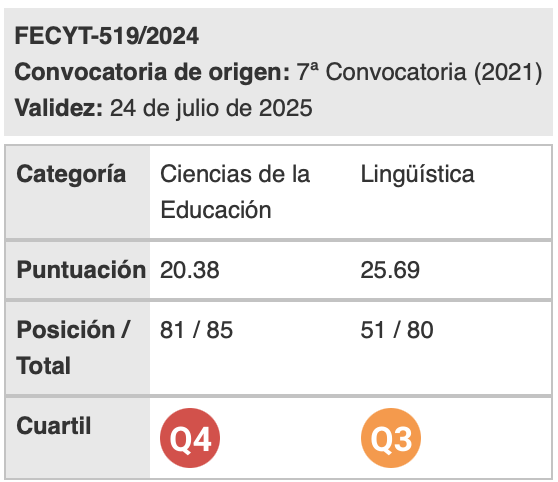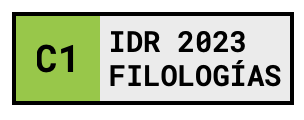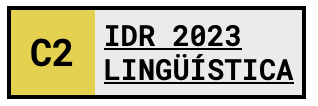Modal verbs in the abstract genre in the field of tourism
Keywords:
Modal verbs, modality, mitigation, English, tourismAbstract
This paper looks into the use of modal verbs in a corpus of abstracts excerpted from scientific papers in the field of tourism. These texts have been written by specialists in tourism studies. Our study will show the way in which modality is used to show the authors’ intention as to the contents of their texts. The pragmatic implications of modal uses will be highlighted bearing in mind the purposes of the abstractgenre within the academic paper. The methodology of study is corpus linguistics, and the framework of analysis includes the works of Palmer (1979; Palmer, 1986)and Collins (2009), among others. This paper is part of a larger research on modal verbs in touristic scientific papers.Downloads
References
Alonso-Almeida, F. (2014). Evidential and epistemic devices in English and Spanish medical, computing and legal scientific abstracts: A contrastive study. In M. Bondi & R. Lorés Sanz (Eds.), Abstracts in Academic Discourse. Linguistic Insights (pp. 21–42). Bern/ New York: Peter Lang.
Alonso-Almeida, F. (2015a). Introduction to stance language. Research in Corpus Linguistics, 5(3), 1–5.
Alonso-Almeida, F. (2015b). On the mitigating function of modality and evidentiality. Evidence from English and Spanish medical research papers. Intercultural Pragmatics. https://doi.org/10.1515/ip-2015-0002
Alonso-Almeida, F. (2015c). Sentential epistemic and evidential devices in Spanish and English texts on computing. In J. R. Zamorano-Mansilla, C. Maíz, E. Domínguez, & M. V. M. de la Rosa (Eds.), Thinking Modally: English and Contrastive Studies on Modality (pp. 383–408). Newcastle upon Tyne: Cambridge Scholars Publishing.
Alonso-Almeida, F., & Carrió-Pastor, M. L. (2017). Variation and Function of Modals in Linguistics and Engineering Research Papers in English. In J. I. Marín-Arrese, J. Lavid-López, M. Carretero, E. D. Martín de la Romero, M. V. Rosa, & M. Pérez Blanco (Eds.), Evidentiality and Modality in European Languages. Discourse- pragmatic perspectives (pp. 277–311). Bern, Berlin, Bruxelles, Frankfurt am Main, New York, Oxford, Wien: Peter Lang.
Alonso-Almeida, F., & Cruz-García, L. (2011). The value of may as an evidential and epistemic marker in English medical abstracts. Studia Anglica Posnaniensia, 46(3). https://doi.org/10.2478/v10121-010-0004-7
Álvarez-Gil, F. J. (2019). Adverbs in -ly in late Modern English. Evidence from the Coruña Corpus of History English Texts. Serie: Estudios de Lingüística Aplicada, Vol. 4. Valencia: Editorial UPV.
Auwera, J. Van der, & Plungian, V. (1998). Modality’s semantic map. Linguistic Typology, 2(1994), 79–124.
Biber, D. (2004). Modal use across registers and time. In A. L. Curzan & K. Emmons (Eds.), Studies in the History of the English Language II: Unfolding Conversations ; [second Biennial Meeting of the Studies in the History of the English Language Conference (abbreviated SHEL-2), was Held at the University of Washington in Seattle in March of 20 (pp. 189–216). Berlin: Walter de Gruyter.
Biel, Ł. (2014). The textual fit of translated EU law: A corpus-based study of deontic modality. Translator. https://doi.org/10.1080/13556509.2014.909675
Brown, L. (2011). Korean Honorifics and Politeness in Second Language Learning (Vol. 206). Amsterdam: John Benjamins Publishing Company. https://doi.org/10.1075/pbns.206
Bybee, J. L., Perkins, R. D., & Pagliuca, W. (1994). The evolution of grammar : tense, aspect, and modality in the languages of the world. Chicago (Ill.) : University of Chicago press.
Caffi, C. (1999). On mitigation. Journal of Pragmatics, 31(7), 881–909. https://doi.org/10.1016/S0378-2166(98)00098-8
Carrió-Pastor, M. L. (2012). A contrastive analysis of epistemic modality in scientific English. Revista de Lenguas Para Fines Específicos, 18, 115–132.
Carrió-Pastor, M. L. (2014). Cross-cultural variation in the use of modal verbs in academic English. SKY Journal of Linguistics.
Carrió-Pastor, M. L. (2016). Mitigation of claims in medical research papers: A comparative study of English- and Spanish-language writers. Communication and Medicine. https://doi.org/10.1558/cam.28424
Carrió-Pastor, M. L., & Calderón, R. M. (2015). A Contrastive Analysis of Metadiscourse Features in Business e-mails Written by Non-native Speakers of English. Procedia - Social and Behavioral Sciences. https://doi.org/10.1016/j.sbspro.2015.02.055
Chafe, W. (1986). Evidentiality in English conversation and academic writing. In W. Chafe & J. Nichols (Eds.), Evidentiality: The Linguistic Coding of Epistemology (pp. 261–272). Norwood: Ablex.
Cheng, W., & Cheng, L. (2014). Epistemic modality in court judgments: A corpus-driven comparison of civil cases in Hong Kong and Scotland. English for Specific Purposes. https://doi.org/10.1016/j.esp.2013.07.006
Collins, P. (2009). Modals and quasi-modals in English / Peter Collins. Amsterdam: Rodopi.
Cutting, J. (2007). Introduction to Vague language explored. In Vague Language Explored (pp. 3–17). New York: Palgrave Macmillan.
Del Lungo Camiciotti, G. (2008). Two polite speech acts from a diachronic perspective: Aspects of the realisation of requesting and undertaking commitments in the nineteenth-century commercial community. In A. H. Jucker & I. Taavitsainen (Eds.) (pp. 115–131). Amsterdam/ New York: John Benjamins Publishing. https://doi.org/10.1075/pbns.176.07del
Depraetere, I., & Reed, S. (2008). Mood and Modality in English. In The Handbook of English Linguistics (pp. 269–290). Malden, MA, USA: Blackwell Publishing. https://doi.org/10.1002/9780470753002.ch12
Domínguez Morales, E. (n.d.). The abstract genre in scientific articles on tourism. In F. J. Álvarez-Gil & M. Bondi (Eds.).
Egan, A., Hawthorne, J., & Weatherson, B. (2005). Epistemic modals in context. In G. Preyer & G. Peter (Eds.), Contextualism in philosophy (pp. 131–170). Oxford: Oxford University Press. https://doi.org/9780199267408 (hbk) 9780199267415 (pbk.)
Fairclough, N. L. (2004). Analysing Discourse: Textual Analysis for Social Research. New York.
Figueiredo, D. (2010). Context, register and genre: Implications for language education. Revista Signos, 43, 119–141. https://doi.org/10.4067/S0718-09342010000300008
Finegan, E. (1989). Styles of stance in English: Lexical and grammatical marking of evidentiality and affect. Text. https://doi.org/10.1515/text.1.1989.9.1.93
Giltrow, J. (2005). Modern Conscience: Modalities of Obligation in Research Genres. Text - Interdisciplinary Journal for the Study of Discourse, 25(2), 171–199. https://doi.org/10.1515/text.2005.25.2.171
Gonzalez, M. (2015). From truth-attesting to intensification: The grammaticalization of Spanish la verdad and Catalan la veritat. Discourse Studies, 17(2), 162–181. https://doi.org/10.1177/1461445614564519
Goodwin, C. (2006). Retrospective and prospective orientation in the construction of argumentative moves. Text & Talk - An Interdisciplinary Journal of Language, Discourse Communication Studies, 26(4–5), 443–461. https://doi.org/10.1515/TEXT.2006.018
Hoye, L. F. (2008). Evidentiality in discourse: A pragmatic and empirical account. In J. Romero-Trillo (Ed.), Pragmatics and Corpus Linguistics: A Mutualistic Entente (pp. 50–174). Berlin; New York: Mouton de Gruyter.
Hyland, K. (1994). Hedging in academic writing and EAF textbooks. English for Specific Purposes. https://doi.org/10.1016/0889-4906(94)90004-3
Hyland, K. (1997). Scientific claims and community values: articulating an academic culture. Language & Communication, 17(1), 19–31.
Hyland, K. (1998). Hedging in Scientific Research Articles (Vol. 54). Amsterdam: John Benjamins Publishing Company. https://doi.org/10.1075/pbns.54
Hyland, K. (2002). Authority and invisibility: Authorial identity in academic writing. Journal of Pragmatics, 34, 1091–1112. Retrieved from http://www.sciencedirect.com/science/article/pii/S0378216602000358
Hyland, K. (2005). Stance and engagement: a model of interaction in academic discourse. Discourse Studies, 7(2), 173–192. https://doi.org/10.1177/1461445605050365
Kärkkäinen, E. (2006). Stance taking in conversation: From subjectivity to intersubjectivity. Text & Talk-An Interdisciplinary Journal of Language, …, 6, 699–731.
Kranich, S. (2009). Epistemic Modality in English Popular Scientific Texts and Their German Translations. TransKom, 2(1), 26–41.
Marín Arrese, J. I. (2009). Effective vs. epistemic stance, and subjectivity/intersubjectivity in political discourse. A case study. In A. Tsangalidis & R. Facchinetti (Eds.), Studies on English modality. In honour of Frank R. Palmer (pp. 23–52). Bern/ New York: Peter Lang.
Martín-Martín, P. (2008). The Mitigation of Scientific Claims in Research Papers: A Comparitive Study. International Journal of English Studies. https://doi.org/10.6018/ijes/8/2/49201
Martin, J. R. (1997). Analysing genre: Functional parameters. In Genres and institutions: Social processes in the workplace and school (pp. 3–39). London: Cassell.
Martin, J. R. (2000). Beyond exchange: APPRAISAL systems in English. In S. Hunston & G. Thompson (Eds.), Evaluation in text: authorial stance and the construction of discourse (pp. 142–175). Oxford: Oxford University Press.
Martin, J. R., & White, P. R. R. (2005). The Language of Evaluation. London: Palgrave Macmillan UK. https://doi.org/10.1057/9780230511910
Nuyts, J. (2001). Subjectivity as an evidential dimension in epistemic modal expressions. Journal of Pragmatics, 33(3), 383–400. https://doi.org/10.1016/S0378-2166(00)00009-6
Palmer, F. R. (1979). Modality and the English modals (1st editio). London: Longman.
Palmer, F. R. (1986). Mood and modality. Cambridge textbooks in linguistics. Cambridge [Cambridgeshire] ; New York: Cambridge University Press.
Pic, E., & Furmaniak, G. (2012). A study of epistemic modality in academic and popularised discourse: the case of possibility adverbs perhaps, maybe and possibly. Revista de Lenguas Para Fines Específicos, 18, 13–44.
Yang, A., Zheng, S. yuan, & Ge, G. chun. (2015). Epistemic modality in English-medium medical research articles: A systemic functional perspective. English for Specific Purposes. https://doi.org/10.1016/j.esp.2014.10.005
Downloads
Published
How to Cite
Issue
Section
License
Authors who publish with this journal agree to the following terms:
- Authors retain copyright and grant the journal right of first publication with the work simultaneously licensed under a Creative Commons Attribution License that allows others to share the work with an acknowledgement of the work's authorship and initial publication in this journal.
- Authors are able to enter into separate, additional contractual arrangements for the non-exclusive distribution of the journal's published version of the work (e.g., post it to an institutional repository or publish it in a book), with an acknowledgement of its initial publication in this journal.
- Authors are permitted and encouraged to post their work online (e.g., in institutional repositories or on their website) prior to and during the submission process, as it can lead to productive exchanges, as well as earlier and greater citation of published work (See The Effect of Open Access).

Revista de Lenguas para fines específicos is licensed under a Creative Commons Reconocimiento-NoComercial-SinObraDerivada 4.0 Internacional License.
























